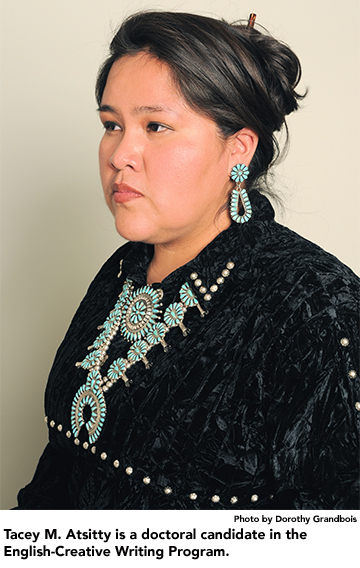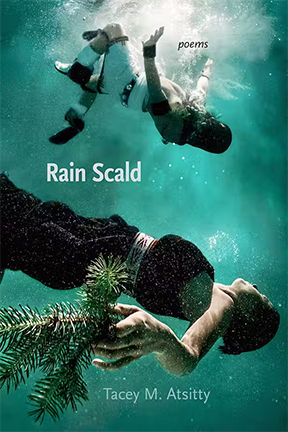Ph.D. student Tacey M. Atsitty wins Brittingham Prize in Poetry
By Alejandro Caballe
In late February 2023, Tacey M. Atsitty was sitting in her office cubicle at her computer when she loudly gasped. Her colleagues were initially concerned that something had happened to her.
Their worries were swiftly washed away once they learned that Atsitty had just received an email confirming that, out of over 850 entrants, she had won the Brittingham Prize for Poetry for her manuscript (At) Wrist.
 “I was sitting in my office, started checking my email, and saw an email from Wisconsin,” recalls Atsitty, a Florida State University doctoral candidate in the English-Creative Writing Program. “I thought, ‘Oh I probably just lost; it was a good effort.’ And then I read it, re-read it, and I gasped really loud.
“I was sitting in my office, started checking my email, and saw an email from Wisconsin,” recalls Atsitty, a Florida State University doctoral candidate in the English-Creative Writing Program. “I thought, ‘Oh I probably just lost; it was a good effort.’ And then I read it, re-read it, and I gasped really loud.
“There were two other graduate students in the same room asking if I was OK after hearing me gasp, and I said enthusiastically, ‘I won a prize.”
The Brittingham Prize for Poetry is sponsored by the University of Wisconsin, with an outside judge choosing the winner from hundreds of entries. Eduardo C. Corral, an accomplished author and professor of English at North Carolina State University, was this year’s judge.
“There were so many other competitors, and to be chosen as the winner is a special experience in such a competitive pool,” Atsitty says. The University of Wisconsin Press will publish (At) Wrist in the fall of 2023.
In the award announcement, FSU English Professor James Kimbrell says, “as formally seductive as it is subversive, Tacey Atsitty’s (At) Wrist is a poetry of deep longing and praise, of loss and the courage of resilience. Anchored in an intimate vision of connectedness, her syntax works its way beyond thought’s limit, setting its hook in the terrain of memory and dream." "This is a book I will return to for what no other poet I know delivers with such daring and vulnerability, a poetry wherein time, body, and the natural world are presented as a singularity otherwise known as love,” Kimbrell says.
Tacey M. Atsitty, Diné, is Tsénahabiłnii (Sleep Rock People) and born for Ta’neeszahnii (Tangle People). She is from Cove, Arizona, and grew up in New Mexico. She has written extensively about the inspiration brought to her from Arizona and New Mexico, stating that much of Rain Scald, Atsitty’s debut poetry book, was inspired by “trying to understand the land and Her stories.”
She has won numerous other awards for her poetry, including the Morning Star Award and a Truman Capote Fellowship. Regarding her poetry, Atsitty stresses the importance of form and the mechanics of poetry. In (At) Wrist, Atsitty notes the prominence of the sonnet, saying that the third part of the book consists of 15 sonnets, where she uses the technique of sonnet redoubling. This means that ensuing sonnets reuse the first line of the previous sonnet as the concluding line, creating a strong thematic tie between poems.
 In Rain Scald, Atsitty’s debut poetry book, she speaks about the concept of ceremony and, “purging the things that are causing imbalance in your life.” While this theme was integral to the poems in that publication, her Brittingham Prize-winning manuscript holds a different approach, which Atsitty describes as, “not as intentionally ceremonial as Rain Scald.”
In Rain Scald, Atsitty’s debut poetry book, she speaks about the concept of ceremony and, “purging the things that are causing imbalance in your life.” While this theme was integral to the poems in that publication, her Brittingham Prize-winning manuscript holds a different approach, which Atsitty describes as, “not as intentionally ceremonial as Rain Scald.”
(At) Wrist is a deeply personal collection of poetry, Atsitty adds. She describes the collection as being emotionally based, drawing from the various relationships and experiences in her life.
“With (At) Wrist, my lived experiences and cultural background completely influence my writing,” Atsitty says. “Every poem, every thought comes from who I believe I am as a person, physically and spiritually. Everything that's written is from a piece of me.”
Atsitty notes that although the poems draw from personal experience, she believes the themes resonate with many people because of the shared human experience everyone understands.
Although Atsitty has won numerous awards, the Brittingham Prize for Poetry is a special experience, she says. The sheer volume of contestants for the award made this experience different from the rest.
In fact, the competitive nature of the award led Atsitty to believe that she wouldn’t win. About two months before she received the congratulatory email, she received one announcing that her manuscript was a finalist, one of 30 finalists out of 850 submissions.
“I thought, ‘That's nice,’ but I still didn’t have my hopes up too high, maybe it’d make the top 10,” she says. “I really didn't think it would win.”
After the judging process had concluded, however, (At) Wrist stood alone as the winner.
Alejandro Caballe is double majoring in English-Editing, Writing, and Media and international affairs.
Follow the English department on Instagram @fsuenglish; on Facebook facebook.com/fsuenglishdepartment/; and Twitter, @fsu_englishdept
